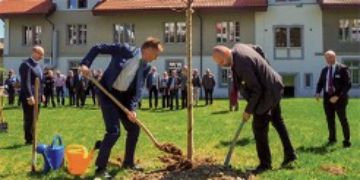Main board: Vergeben und Versöhnen - Forgiving and Reconciling
Lack of understanding and stubbornness, bitter hostility or helpless distance characterized the relationship between the Reformed Church and Anabaptism. It was not until the 20th century that steps were taken toward one another. Official apologies, for example in Zurich or Bern, cleared the way for mutual respect and fruitful cooperation.
"We confess that the persecution of that time was, according to our conviction today, a betrayal of the Gospel and that our Reformed fathers were mistaken on this point.
We respect the radical approach of the Anabaptist movement to be salt of the earth and light of the world as a free community of determined believers, putting the message of the Sermon on the Mount into concrete practice."
Reformed Church Council of the Canton of Zurich, Ruedi Reich, 2003

"Steps of Reconciliation": Bernese Cantonal Councillor Christoph Neuhaus and President of the Mennonites of Switzerland Lukas Amstutz plant a tree together in Tavannes in April 2019, (Photo: Raphael Burkhalter).
"And so, in all humility, I ask your forgiveness for all that has been done to the Anabaptists in our canton. No one can undo what has once been done. But we can see what has been. To take it in instead of suppressing it. Recognize it as our common history instead of splitting off from us."
Bernese Government Councillor Christoph Neuhaus 2017
Today, many churches - Anabaptist or otherwise - no longer see themselves as enemies, but as parts of a great whole. There is a unity in Christ in which diversity is also welcome. Precisely for this, the quilt is a beautiful image.
Today, many people and churches no longer view the Anabaptist commitment to reconciliation and renunciation of violence critically, but as forward-looking. May the example of "the old Anabaptists" still inspire many people to forgive, to receive forgiveness and to make peace. Only on such "paths to freedom" can there be more reconciliation and justice!



